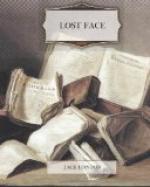“Now Dave was as true as the Pole Star, and she was as false as a magnetic needle in a cargo of loadstone. Dave was as steady and solid as she was fickle and fly-away, and in some way Dave, who never doubted anybody, doubted her. It was the jealousy of his love, perhaps, and maybe it was the message ticked off from her soul to his; but at any rate Dave was worried by fear of her inconstancy. He was afraid to trust her till the next year, he had so to trust her, and he was pretty well beside himself. Some of it I got from old Victor Chauvet afterwards, and from all that I have pieced together I conclude that there was something of a scene before Dave pulled north with his dogs. He stood up before the old Frenchman, with Flush of Gold beside him, and announced that they were plighted to each other. He was very dramatic, with fire in his eyes, old Victor said. He talked something about ‘until death do us part’; and old Victor especially remembered that at one place Dave took her by the shoulder with his great paw and almost shook her as he said: ’Even unto death are you mine, and I would rise from the grave to claim you.’ Old Victor distinctly remembered those words ’Even unto death are you mine, and I would rise from the grave to claim you.’ And he told me afterwards that Flush of Gold was pretty badly frightened, and that he afterwards took Dave to one side privately and told him that that wasn’t the way to hold Flush of Gold—that he must humour her and gentle her if he wanted to keep her.
“There is no discussion in my mind but that Flush of Gold was frightened. She was a savage herself in her treatment of men, while men had always treated her as a soft and tender and too utterly-utter something that must not be hurt. She didn’t know what harshness was . . . until Dave Walsh, standing his six feet four, a big bull, gripped her and pawed her and assured her that she was his until death, and then some. And besides, in Dawson, that winter, was a music-player—one of those macaroni-eating, greasy-tenor-Eye-talian-dago propositions—and Flush of Gold lost her heart to him. Maybe it was only fascination—I don’t know. Sometimes it seems to me that she really did love Dave Walsh. Perhaps it was because he had frightened her with that even-unto-death, rise-from-the-grave stunt of his that she in the end inclined to the dago music-player. But it is all guesswork, and the facts are, sufficient. He wasn’t a dago; he was a Russian count—this was straight; and he wasn’t a professional piano-player or anything of the sort. He played the violin and the piano, and he sang—sang well—but it was for his own pleasure and for the pleasure of those he sang for. He had money, too—and right here let me say that Flush of Gold never cared a rap for money. She was fickle, but she was never sordid.




